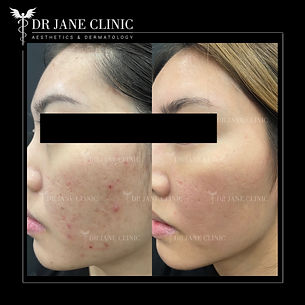
Effective Acne Treatment Begins Here
-
Clear Skin
-
Reduce inflammation
-
Clears clogged pores
-
Reduce Acne-inducing bacteria
WhatsApp Us Now to Book an Appointment
Achieving Clear Skin: Exploring Different Modalities of Acne Treatment
Acne is a common skin condition that affects millions of people worldwide, causing emotional distress and affecting self-esteem. Fortunately, there are various effective treatment modalities available to combat acne and restore clear, healthy skin. In this article, we will delve into different types of acne treatment and discuss their benefits, considerations, and potential outcomes.

Form of Acne Treatment at Dr Jane Clinic
1. Topical Treatment
Topical treatments are the first line of defense against acne, targeting the surface of the skin to control oil production, reduce inflammation, and unclog pores.
Here are some commonly used topical treatments:

This powerful ingredient effectively kills bacteria, reduces inflammation, and helps clear clogged pores.
It is available in different strengths and formulations, such as creams, gels, and cleansers.

Derived from vitamin A, it regulates skin cell turnover, prevents the formation of clogged pores, and reduces inflammation.
They come in various forms, with varying strengths and application methods.

This beta-hydroxy acid exfoliates the skin, unclogs pores, and reduces inflammation.
Salicylic acid is commonly found in cleansers, toners, and spot treatments.
2. Oral Medications
For moderate to severe acne, oral medications may be prescribed. These treatments target the underlying causes of acne, including hormonal imbalances and bacterial overgrowth.

Oral antibiotics, reduce acne-causing bacteria and inflammation. They are typically prescribed for a short period to avoid antibiotic resistance.
A potent oral medication reserved for severe, nodular acne or cases that haven't responded to other treatments. It reduces oil production, unclogs pores, and has long-lasting effects.
However, this can only be prescribed by Doctors and this requires close monitoring due to potential side effects.
3. Facial Treatment

Facial extraction is a common technique used by skincare professionals to remove comedones (blackheads and whiteheads) and other non-inflammatory acne lesions manually.
HydraFacial MD® uses a patented Vortex –Fusing™ technology to support healthy skin by targeting and improving congested and enlarged pores, oily or acne-prone skin without using manual extraction. On top of that, HydraFacial MD® improves fine lines and wrinkles, hyperpigmentation and sun damaged or ageing skin. Find out more about HydraFacial MD® here.
4. Laser & Light-based Therapies
Light-based therapies utilize different wavelengths of light to target acne-causing bacteria and reduce inflammation. These treatments are non-invasive and can be performed at Dr Jane Clinic. Here are two commonly used light-based therapies:

Blue light targets and destroys acne-causing bacteria, effectively reducing inflammation and preventing new breakouts.
It is often used in combination with other treatments.

Laser treatments, such as pulsed-dye laser or fractional laser, can improve acne by targeting sebaceous glands, reducing oil production, and promoting collagen production for smoother skin. Kindly contact us here to find out more about laser treatments for acne.
5. Chemical Peels
Chemical peels involve applying a chemical solution to the skin, which exfoliates the top layers, unclogs pores, and reduces acne. They can be categorized as superficial, medium, or deep, depending on the strength of the peel. Chemical peels may contain ingredients like alpha-hydroxy acids (AHAs), beta-hydroxy acids (BHAs), or trichloroacetic acid (TCA).

Testimonials
Meet Our Doctors

Dr Jane Frances
Doctor of Medicine (M.D.)
Postgraduate Certificate In Primary Care Dermatology
Graduate Certificate In Primary Care Dermatology
Professional Diploma in Aesthetic Medicine
Specialises in aesthetic treatments including fillers, toxin, threadlift and lasers & energy based treatments

Dr Huey Ming
Doctor of Medicine (M.D.)
Medical Aesthetic Certification
Specialises in aesthetic treatments including fillers, toxin, threadlift and lasers & energy based treatments
-
Is there a universal approach to acne treatment?No, acne treatment is not one-size-fits-all. Various treatments, including topical products, oral medications, light-based therapies, and chemical peels, are available depending on the severity of acne and individual needs.
-
Why is it important to consult a doctor for acne treatment?Consulting a doctor is crucial because they can assess your specific skin condition and underlying factors contributing to acne. Based on this, they can recommend the most suitable treatment options for your case.
-
How long does it take to see results from acne treatment?Results may not be immediate, and significant improvements can take time. Consistency and Patience are essential when following your prescribed acne treatment plan.
-
How can I enhance the effectiveness of my acne treatment?Alongside your treatment plan, adopting a comprehensive skincare routine—such as gentle cleansing, moisturizing, and sun protection—can enhance your results. We recommend Dr. Jane Skincare for the best outcome.
-
How does lifestyle impact acne management?Maintaining a healthy lifestyle is crucial for managing acne. A balanced diet, regular exercise, stress management, and adequate sleep all contribute to overall skin health and can help reduceacne breakouts. For more information, you can visit our website or follow us on social media platforms like Instagram, Facebook, YouTube, and TikTok.
-
Should I treat acne myself or seek professional help?While some over-the-counter treatments can be effective, it's often best to seek professional advice. A doctor can provide personalized treatment options to help you achieve clearer skin and improved well-being.
-
How do I begin my acne treatment journey?Contact us for guidance. We'll help you take proactive steps toward achieving clearer skin and boosting your self-confidence.








